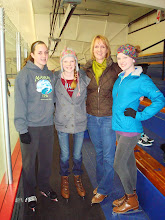The most striking revelation I have had as a result of this course is that it is the responsibility of all educators, not just computer teachers, librarians, or media specialists, to participate in the teaching of new literacy skills to students of all ages. This point was made by authors Eagleton and Dobler (2007) in the opening paragraphs of their book, Reading the Web: Strategies for Internet Inquiry. As a former business education instructor, I used to carry the weight for providing students with online inquiry skills. So often, teachers would send students to my classroom to work on research assignments without any guidance or previous instruction in conducting online research. It then would become necessary for me to show them how to define or refine their research questions, how to use a search engine effectively and efficiently, how to synthesize their findings, and how to cite their resources properly. It became a burden at times instead of something enjoyable. The way students learn and will continue to learn has changed. The vast world of Internet resources will continue to be used by students in all subject areas. The time has arrived for all teachers to become participants in the teaching of new literacy skills.
For me, one of the most beneficial aspects of this course has been learning the QUEST inquiry method (Eagleton and Dobler, 2007). It has been exciting to see the work that these educators and others such as November (2008) have done to synthesize the components of online inquiry-based learning and to create models for teaching new literacy skills. The texts used in this course are full of valuable tips and methods that are organized in a way that gives much needed structure to teaching online inquiry. I have shared some of the handouts and strategies with our junior high computer literacy teacher who has already successfully put them to use with her students. In the future, as I have more access to computers for my own students, I will use the strategies in my own classroom.
My professional development goal after taking this course is to share the methods I have learned with as many teachers in our district as I can reach. I have already offered to provide in-service training during our weekly Wednesday afternoon professional development hour. My second goal is contingent upon my assigned teaching duties next year, which I hope will include teaching computer literacy classes to 7th and 8th graders. If I am assigned to teach those courses, then I will work to establish one unit of study with each of the teachers in math, science, and social studies that will include online inquiry as one of its major components. This is exciting for me to look forward to, as I have so many new ideas as a result of this course. This new role will allow me to share my passion for creating an awareness of the need for all teachers in all grades and subject areas to become involved in the teaching of new literacy skills.
References
Eagleton, M. B., & Dobler, E. (2007). Reading the web: Strategies for internet inquiry. New York, NY: The Guilford Press.
November, A. (2008). Web literacy for educators. Thousand Oaks, CA: Corwin Press.
Subscribe to:
Post Comments (Atom)




Replaced the cartridge, very same problem with grinding.
ReplyDeleteDon't know just what to do due to the fact that its 6 years aged, and no real repair locations. I could tear it apart and consider it. Thanks.
Also visit my web page xerox phaser 8560 toner